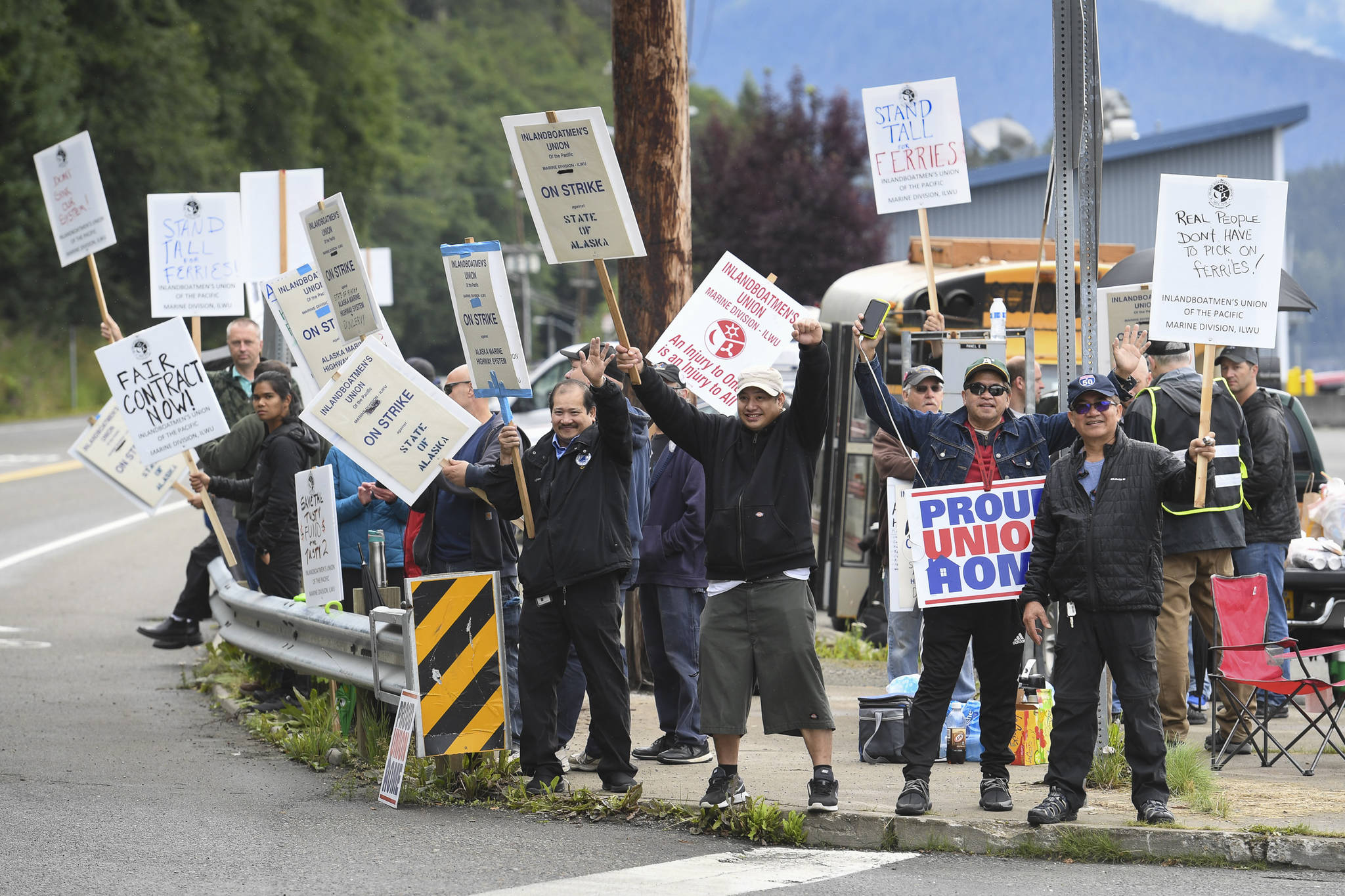Commissioner Kelly Tshibaka announced in a teleconference Thursday the state was working to bring the Inlandboatman’s Union of the Pacific back to the negotiating table after IBU workers went on strike, mooring the ferries of the Alaska Marine Highway System to their piers, engines cold.
Ferry workers picketed the Auke Bay Terminal in Juneau Thursday morning after the IBU declared that negotiations with the administration had run aground. Many cars and trucks passing the picketers could be heard honking their horns as they passed, possibly in solidarity with the workers. Picketers seemed unphased by dreary weather and disappointed with the administration’s failure to negotiate in earnest.
“One of the provisions they are striking is illegal, which means the strike is illegal and unprotected,” said Tshibaka. She said this threat had been communicated to the IBU via letter at 12.30 p.m. on July 25.
“There are different consequences for that,” Tshibaka said, mentioning that taking this affair to court would be the next level of escalation. Her claim that the strike is illegal is tied to the IBU’s request pertaining to a cost of living differential. When this was communicated to the IBU, they amended their statement to bring it within the boundaries of protected strikes, but the state refused to recognize this and still holds the position that the strike is illegal.
“What they’re offering doesn’t cover our health care,” said Rob Arnold, vice chairman with the IBU. Ferry workers don’t receive an automatic yearly increase on their wages to deal with health insurance cost increases like other state employees, said Arnold, forcing them to negotiate for the small increase every year.
“I hope the governor puts his heart in it and thinks about the people, not about his agenda,” said Jerry Slackey, a member of the picket line. “This isn’t just about our jobs, this is about our communities. This is their lifelines to hospitals and grocery stores. This is what gets them back and forth.”
Both the IBU and the state seem to agree that the incident is halting a crucial service in keeping the communities in southeast Alaska functioning and viable. “I think for our coastal communities this is a really significant incident,” said Tshibaka. “I think whether we call it crisis depends on how much someone depends on the AMHS. For our coastal communities, this is a major crisis.”
However, the governor’s budget proposals seem to say precisely how much he really cares about the communities in the Southeast, as his proposed budget would slash winter service schedules, fail to improve the wages of ferry workers to keep up with rising cost of living, and eliminate to funding to other critical programs supporting community health and public safety.
“Our union has been trying to work with the state for a couple years, but the state is not taking us seriously,” said Roel Mangaccat, a member of the IBU picketing the terminal. “All of us see this as a last resort but we’re out of options. They seem like they’re against us.”
Another organized labor groups support the IBU’s cause.
[Hotel-Motel tax could go up to fund Centennial Hall improvements]
“We are standing in solidarity with our brothers and sisters in the IBU in their struggle for fair treatment and we will do everything in our power to help them,” said Dennis Young, President of Juneau’s local chapter of the International Longshore and Warehouse Union.
However, the longshoreman are not able to walk out on strike at this time.
“I want our IBU employees back to work,” said Tshibaka. “I want them back on their ships.” The disruption, she said, has disrupted a large number of travellers.
Tshibaka said the state has refunded more than $500,000 in fares for trips affected by the strikes, though the Department of Transportation was still compiling those numbers at press time. Travellers affected by the strikes may call the Alaska Department of Transportation for assistance at 465-3941.
• Contact reporter Michael S. Lockett at 523-2271 or mlockett@juneauempire.com.

